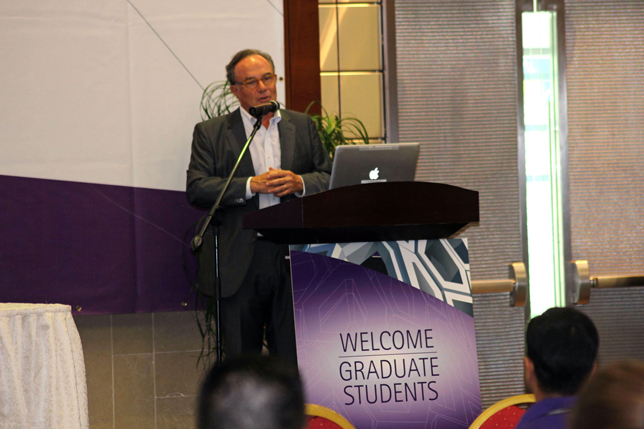The big question: Advice for new students from Dean Magistretti

Prof. Pierre Magistretti, Dean of KAUST's Biological and Environmental Science and Engineering Division and Bioscience Professor
"I really think that for science to be an inspiration, for science to be exciting, you have to address a big question," said Prof.Pierre Magistretti, Dean of KAUST's Biological and Environmental Science and Engineering Division and Bioscience Professor, during a recent orientation speech to new students.
The guiding principles Prof. Magistretti focused on in his talk were: curiosity, passion, establishing a short and long-term vision, and balancing the requirements of being both self-critical and self-confident.
As he reminded the incoming Masters and Ph.D. candidates that they are in "one of the best places in the world to do science" Magistretti said it's really up to them to follow their curiosity and identify important questions -- with the help of their mentors. Stressing the importance to apply themselves to learning proven and accepted scientific knowledge, he cautioned students, especially the ones doing original research, to not be afraid of questioning prevailing paradigms.
"If you want to advance science you have to tackle, as I said, a big question for which there is not yet an answer." he said. Highlighting the fact that established scientists have several decades of experience in their field, and thus may be inclined to think more within the mainstream, he pointed out that "the fact that graduate students have less knowledge about the field may sometimes be helpful because this provides them with an unbiased, fresh eye toward a question." "When you do experiments, when you do research don't let your creativity be too much constrained by the knowledge," Magistretti cautioned. It is a matter of balance : of course you need to first learn the founding principles and knowledge in a field and you have to build on this to conceive new experiments, but be open to thinking outside the box. Don't be afraid to at least question established knowledge"
Expressing his confidence that the students must possess that curiosity fiber to have been accepted at KAUST, Prof. Magistretti said that those traits of curiosity and passion represent the bedrock of a scientific career.
"As a scientist you have to like uncertainty. You have to like to be in unchartered territory and you must not be unsettled by the unknown. Actually, you have to be driven by the unknown. And that's a matter of passion. So this is really an engine to move ahead in your quest for knowledge and discovery. You need passion," he said.
Establishing Long and Short-Term Goals
Defining what "the big question" is, however, only the first step. Equally important is devising a sustainable strategy to stay on track. The short-term goals have to be very rigorous, very concrete, very down-to-earth and integrated in a long-term vision. But at the same time students "should think long-term and a vision about the question that they want to answer. It's a juggling act every day," as Magistretti explains.
Having their research published in a great journal is an ambition of any graduate student as they embark in research; this a very noble and legitimate goal and certainly a "must" to continue successfully their academic career. However it should not be their only goal. Imparting his advice, the BESE Dean said: "Your goal should be to find significant -- especially if you are in a place like KAUST with its extraordinary resources both in terms of the quality of their advisors and the outstanding research facilities . At the same time, as you go to the lab everyday to conduct experiments and try something new, be ready to accept failure. Original experiments rarely work the first time around . You must keep on persisting until, with the help of your mentor you move on to another approach" . Here also it is a matter of balance." Having the passion and the vision to address big questions will help overcome the frustrations of the short-term goals that sometimes inevitably occur.
The Importance of Self-Confidence
"In addition to being curious, driven and passionate, you have to be self-confident when you do science," Prof. Magistretti told the incoming students. "You really have to believe in yourself. This is important. The experiment didn't work, you'll try another one and modify this but you go ahead. However, at the same time you have to be extremely, and I really underscore, extremely self-critical. At every moment of your journey in science you have to question what you have found. Is this really true? Is this an artifact maybe? Or is this something that is only marginal and you kind of blow it up thinking that it's a big and important observation. So here again you need to have a balance."
The path to a Ph.D. isn't always easy. A student may have an idea which he or she thinks is revolutionary. "Here, you have to trust the knowledge that your mentor has acquired over the years and let him or her orient you towards where you can bring a significant and realistic contribution. But I think, particularly as you progress in your Ph.D., as you read more and acquire more knowledge, you should sharpen your critical appraisal of how you could direct your research towards an innovation ."
Stressing the importance of balance between self-confidence and self-criticism, between trusting existing knowledge and questioning it, between short-and long-term goals, between persistence and acknowledging failure of an approach, Dean Magistretti concluded with a quotation from the 19th century American philosopher Ralph Waldo Emerson: "It is easy in the world to live after the world's opinions. It is easy in solitude to live after your own, but the great man/woman is he/she, who in the midst of the crowd keeps with perfect sweetness the independence of solitude."
- by Meres J. Weche, KAUST News

